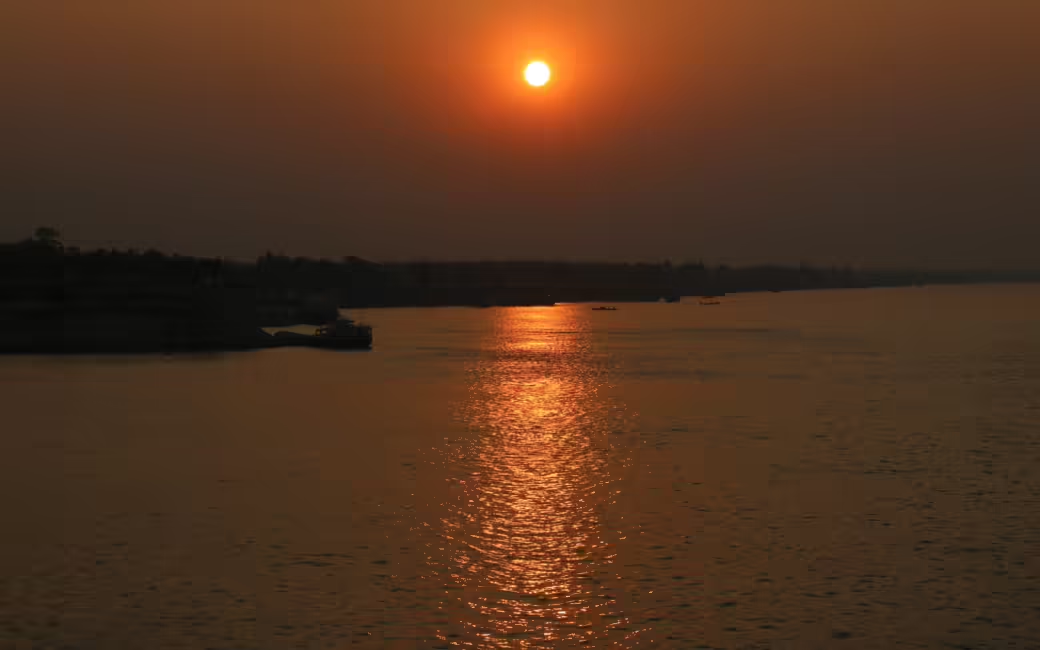Memories of Padma
The summer grandfather lies on his deathbed, my uncle takes me in to live with his family in Jangipur. Grandfather has cancer and this is kept from me. I am thirteen and have never been away from my small-town life. Jangipur is also small, but what adds to the thrill is my uncle’s bungalow—a crumbling colonial building replete with exposed-beam ceilings and cavernous rooms. Right outside the bungalow, flows Bhagirathi—the distributary of the Ganga that traverses the lower half of our state of West Bengal to meet the sea.
My feisty cousin had taught herself to swim in these waters. That summer, I become her shadow. We traipse across town in a rickety tonga pulled by a scrawny horse, whose master is an elderly Muslim man we call Chacha. We while away our days eating kulfi from roadside vendors and watching Hindi films in unlicensed video parlors. Films that our parents have deemed off-limits.
Midsummer, the heat keeps us in. One afternoon, as we sweat under the laborious whirring of a ceiling fan, my eyes fall on a map fluttering on the wall. I trace a finger over the prominent blue flow of Ganga’s main distributary, Padma, which is another name for the lotus-eyed goddess, Laxmi. Bhagirathi is a mere trickle in comparison, a thin blue line.
After parting ways with Ganga, Padma enters Bangladesh, the land my grandparents had left behind just before the Partition. My grandfather had been forewarned by a friend about the changing skies. My grandmother and her children left the only home they knew and never went back. They crossed the river into West Bengal, India, and later, my grandfather joined them. They managed to avoid the physical violence that ensued, yet their displacement was rooted in tacit violence. Forced to start over, my grandparents always carried the pent-up sorrow of being outsiders.
These details I will learn later. For now, all I know is that Bangladesh is where they came from. An unnamed emotion burgeons, but I don’t recognize it as ancestral pull. I focus on the map and how the great Padma is within reach. Jangipur is a border town, and this river is the physical boundary that separates India and Bangladesh. Along some stretches, however, the border zigzags right through the river, and this seems mildly farcical to me. Where do the waters of both nations mingle? How can something fluid like water be demarcated? Who gets to decide?
At this moment though, all I want to do is catch a glimpse of our ancestral land, and I figure that this is our only chance, for now at least. I’ve merely to allude to it when my cousin pulls me outside onto the dusty streets that lay hushed in the blazing sun. She finds Chacha in a stupor of siesta and shakes him awake. She talks the old man into following her whims, and after a bumpy ride across meandering lanes and backroads, we are at the banks of the vast river. I had never seen the sea and decide that it must look like this. Islands of sandbars have begun to rise, but the water still stretches to the horizon.
The Padma we face is no lotus-eyed beauty. This Padma is earthy. Her pull is the raw pull of blood. The far shore is a hazy outline—foreign and mysterious. Are those rounded tops of trees, plantain orchards, and mud huts? We aren’t sure. Yet, the names we had overheard from our elders lilt tenderly off our tongues—Rajshahi, Natore, Satkhira. We have now seen the land of our forefathers. Where my grandmother lost her girlhood at fourteen when she was married off into an enormous household. Where two of my uncles remained boys forever. Where my aunt became a woman. Where my grandfather made the grave decision of moving his family into unfamiliar territory on the other side of the great river. Where the mango orchards bloom every spring just like they do on this side of the river. Where moonlit fields are just as ethereal, and the jui blossoms just as fragrant.
The dying sun shimmers on the undulating waters that carry the fables of an ancestral home and the scars of a bifurcated history. Behind us, Chacha breaks out into a half-forgotten song—O waves of Padma / carry with you my empty lotus-heart.
Sayantani Roy
Sayantani Roy grew up in small-town India and writes from the Seattle area. She has placed work in Contemporary Haibun Online, Ekphrastic Review, Gone Lawn, Heavy Feather Review, Panoplyzine, TIMBER, and elsewhere. This season, she is participating as a mentee in the AWP mentorship program. Say hello on Instagram @sayan_tani_r.

